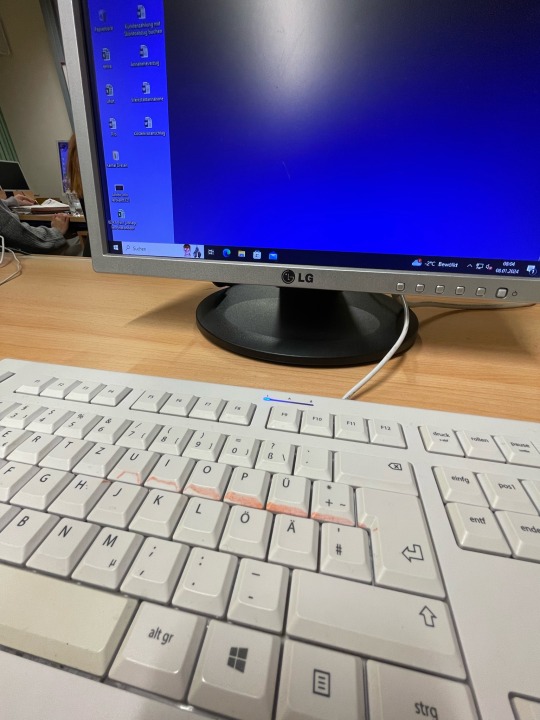#berufsschule
Text
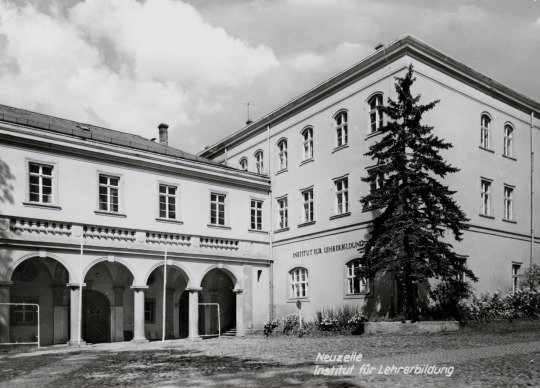

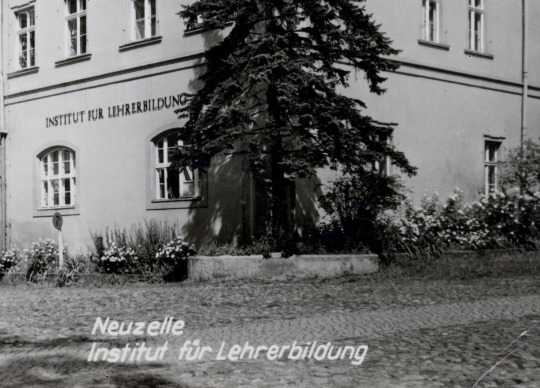

"Ich weiß gar nicht mehr wo mir der Kopf steht."
Ansichtskarte
Neuzelle
Institut für Lehrerbildung
Bestensee: PGH "Rotophot" Werkstätten für Fototechnik, Bestensee bei Berlin (F 34-67 III 9 109)
1967
#Neuzelle#Bezirk Frankfurt Oder#1960er#1967#PGH Rotophot#Philokartie#DDRPhilokartie#InstitutFürLehrerbildung#Berufsschule#AlltagskulturDerDDR#akNeuzelle#BezirkFrankfurtOder#Ansichtskartenfotografie#AnsichtskartenfotografieDerDDR#deltiology#VintagePostcard
8 notes
·
View notes
Text
living in slazburg for 2 months and having a very annoying roommate – keeping u upted on how it goes
0 notes
Text
Der Neubau der Berufsschule in Höchstädt erlebt einen Meilenstein
Höchstädt: „…Wichtiger Schritt für das Millionenprojekt: Das Richtfest für den Praxisteil der Staatlichen Berufsschule wird gefeiert. In einem Jahr soll das Gebäude eingeweiht werden.
Es ist ein gigantisches Projekt. Nicht nur der Anblick des Gebäudes, sondern auch die blanken Zahlen beeindrucken: 22,5 Millionen Euro Gesamtkosten, knapp zehn Millionen Euro Förderung, zwei Bodenhallen, 16…

View On WordPress
#Anblick#Berufsschule#Förderung#Fortschritt#Gebäude#Gewächshaus#Höchstädt#Meilenstein#Millionenprojekt#Neubau#Nutzfläche#Projekt#Quadratmeter#Richtfest#Rohbau
0 notes
Text
Fachoberschule
Unsere Schüler und Schülerinnen der Fachoberschule Technik sind sowohl technisch als auch handwerklich begabt.
Solid Works trifft 3D-Druck
#fachoberschule#solid#solidworks#baugruppen#cad#dremel#berufsbildendeschulen#technik#rinteln#berufsschule#schule#wirliebentechnik#3dprinting#danke#bbsrinteln#schaumburg
1 note
·
View note
Text
omg 29€ ticket for students and Azubis starting september 1st?? why did nobody tell me you have to order it 2 weeks in advance, now it's too late for me to get it for september ☹️
#but luckily for september i still have my Studentenausweis so that's ok#but I will need to get a train ticket for. Berufsschule. at least I think I have Berufsschule in september? might be october actually idk#I'll have to check again#doddie redet#also bavaria only as far as i can tell. sorry.
4 notes
·
View notes
Text
My brain, out of fucking nowhere: hmmmm Goodween dyslexic??? 🤔🤔
#i have to stop pushing marginalizations on this man#könnte damit zusammen hängen dass mein bruder in der berufsschule so ein bisschen der fürsprechrr der leute mit lrs geworden ist#because disability rights#anyway#kaj rambles#to delete later#maybe better not. maybe just make it a late night report that's crawling with typos.
4 notes
·
View notes
Text
ach du scheiße ich hab dann wieder ne einschulung und sv und fucking vertretungpläne
0 notes
Text




Ansichtskarte
Apolda
Ingenieurschule für Baustofftechnologie
Reichenbach (Vogtl): VEB BILD UND HEIMAT Reichenbach i.V. (V 11 50 A 1/B 11/66 9/3490)
Foto: W. Lange, Leipzig
1966
#Apolda#Berufsschule#1960er#1966#Bus#Schule#Philokartie#DDRPhilokartie#Architekturphilokartie#akApolda#BezirkErfurt#AlltagskulturDerDDR#DDRArchitektur#GDRArchitecture#SocialistArchitecture#Ansichtskartenfotografie#AnsichtskartenfotografieDerDDR#deltiology#VintagePostcard#Thüringen#Bezirk Erfurt#BILD UND HEIMAT#Werner Lange
13 notes
·
View notes
Text

Berufsschule Angerstraße (1926-27) in Hamburg, Germany, by Fritz Schumacher. Photo by Carl Dransfeld.
453 notes
·
View notes
Text
Deutschribing Germany
Education
Education in Germany is free and compulsory between ages six and sixteen. States (Länder) are largely responsible for education, with the federal government playing a minor role.
Types of schools
The vast majority of children attend state schools, but there are private schools (Ersatzschulen) as well. The latter have very low tuition fees and are also subsidized by the state, which effectively makes them privately-run schools funded by the state. Some are run by religious groups.
School terms
The school year is divided into two terms (from August to January and from February to July) and starts after the summer break, which differs from state to state but usually finishes in mid/end-August. Children have twelve weeks of vacation in addition to public holidays. Exact dates differ between states, but there are generally six weeks of summer vacation, two around Christmas, two around Easter, and two in the fall during the harvest season, since farmers used to need their children for field work.
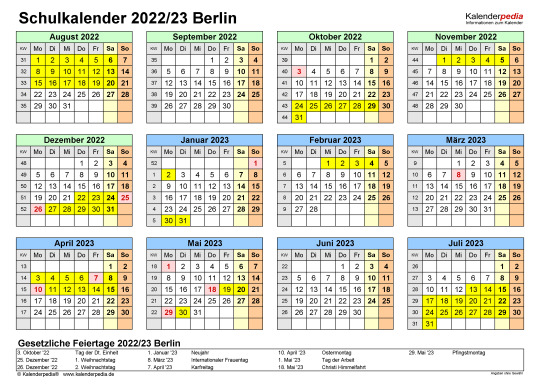
Grades
The German grading system is as follows, from highest to lowest: sehr gut (1.0–1.5), gut (1.6–2.5), befriedigend (2.6–3.5), ausreichend (3.6–4.0), and nicht bestanden (4.1–5.0). The minimum to pass is four.
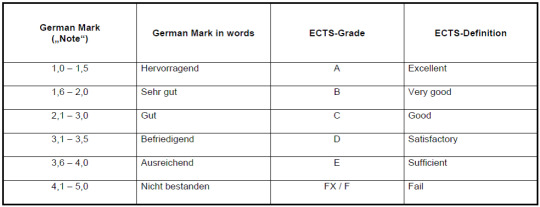
Levels
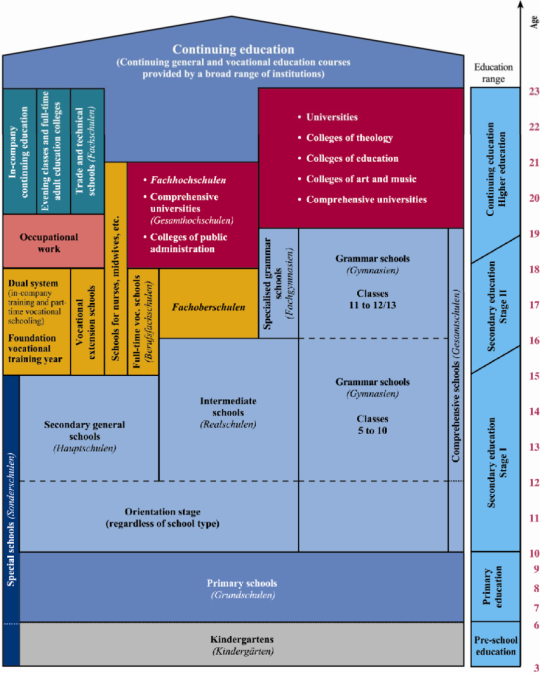
Preschool (Kindergarten)
Preschool education is neither mandatory nor free. Children between the ages of 2 and 6 attend Kindertagesstätte (Kita, “children’s daycare centers”). Many Kitas follow a certain educational approach, such as Montessori or Reggio Emilia.
Primary education (Primarstufe)
Primary education takes place in Grundschulen and generally lasts four years, from 6 to 10 years old. In Berlin and Brandenburg, it lasts six years.
Students are typically taught art, a foreign language (English or French), general studies (natural and social science), German, math, music, physical education, and religion or ethics.
Secondary education (Sekundarstufe)
Secondary education can take place in any of the following schools:
Gymnasium (grammar school) until grade 12 or 13 (ages 10–11 to 17–18/18–19), with Abitur as exit exam to qualify for university
Realschule (intermediate school) until grade 10 (ages 10–11 to 15–16), with Realschulabschluss
Hauptschule (secondary general school) until grade 9 or 10 (ages 10–11 to 14–15/15–16), with Hauptschulabschluss
Gesamtschule (comprehensive school) until grade 10 or 12/13 (ages 10–11 to 15–16 or 17–18/18–19)
The Gymnasium provides in-depth general education for university studies. Hauptschulen teach basic general education leading to vocational school or university entrance qualification. Realschule offers more extensive education than Hauptschule, leading to a vocational or university entrance qualification. A Gesamtschule combines all the aforementioned schools.
There are about twelve compulsory subjects in every grade: biology, chemistry, civics/social/political studies, up to three foreign languages, geography, German, history, math, music, physical education, physics, religion/ethics, and visual arts.
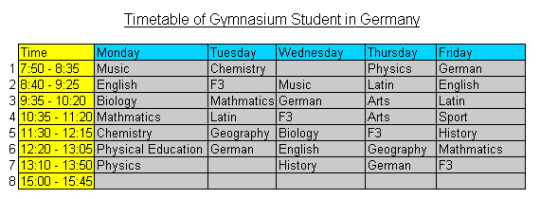
(F3 means Fremdsprache 3 [third foreign language], which is usually French or Spanish)
In grades 11–12/13, each student majors in two or three subjects (Leistungskurse), in which there are usually five lessons per week. The other subjects (Grundkurse) are usually taught three times a week.
Vocational training (Berufsbildung)
Vocational training lasts between two and three and a half years and can take place in any of the following types of school:
Berufsschule (vocational school): the standard type of vocational school, it prepares students for further vocational education or for a job in a profession. Apprentices attend school twice a week and spend the rest of the week working at a company, so they gain knowledge of theory and practice.
Berufsfachschule: similar to Berufsschule, it is aimed at people who want to study specific subjects, such as nursing or occupational therapy.
Fachoberschule (vocational high school): students who have obtained a Realschulabschluss or Hauptschulabschluss can attend a Fachoberschule, where they will specialize themselves in technology, economy, or administration and management, among other subjects. After completing the program, they can study for a university degree after passing the Abitur.
Berufsoberschule (upper vocational school): those who want to attend one need to have graduated from a Berufsschule. It provides in-depth education and training.
Higher education (Tertiärbereich)
To attend university, students need to pass the Abitur exams, of which at least one is oral. They are tested on four or five subjects, including their two or three Leistungskurse and two or three Grundkurse (German, math, and the first foreign language). All knowledge areas must be covered, including language, literature and the arts; social sciences; math, natural sciences and technology, and sports. Each semester of a subject studied in the final two years of Gymnasium yields up to fifteen points, where advanced courses may count double and final examinations count quadruple.
There are 380 universities in Germany, of which 114 are private. Public universities charge fees of around €150–350 per semester, which often include the cost of public transportation. Tertiary education institutions are classified into Universität or Hochschule. The former term is reserved for those which have the right to confer doctorates, in a similar distinction to universities and colleges in the United States. Fachhochschulen (Universities of Applied Sciences) are a type of Hochschule that concentrates on applied science and has a more practical profile with a focus on employability.
There are three types of admissions procedures for degree programs:
Free admissions: every applicant who fulfills the requirements is admitted. This is usually the case in programs in which many students quit, such as engineering, mathematics, or physics.
Local admission restrictions: only a limited number of places are available and students are admitting according to numerus clausus, whose criteria vary depending on the institution and the program but generally include the final grade of the Abitur, a weighted grade average that increases the weight of relevant school subjects, interviews, motivation letters, and/or letters of recommendation.
Nationwide admission restrictions: to study dentistry, medicine, pharmacy, or veterinary medicine, there is a nationwide numerus clausus in which applications are handled centrally for all universities.
There are three official university degrees: Bachelor (bachelor’s degree) takes three years to complete, Master (master’s degree) lasts two years, and Doktorat (doctoral degree or PhD) takes between two and five years.
Students can usually choose freely from all courses offered by the university, but all bachelor’s degree programs require a number of particular compulsory courses in the field of the study program.
60 notes
·
View notes
Text
An meinem alten Gymnasium gab's einen Flügel des 350 Jahre alten Gebäudes der aufgrund von Einsturzgefahr nicht betreten werden durfte. An meiner Berufsschule gab es eine Mensa die nach dem dritten Brand einfach nicht noch mal renoviert wurde. Wenigstens herrscht Baufälligkeits-technische Chancengleichheit.
63 notes
·
View notes
Text
Sanierung der alten Berufsschule: Mehr bauen, damit es weniger kostet
Sanierung der alten Berufsschule: Mehr bauen, damit es weniger kostet
Weilheim: „…Das Gebäude der ehemaligen Berufsschule an der Kerschensteinerstraße in Weilheim soll in Zukunft von der FOS/BOS genutzt werden, die an Raumnot leidet. Allerdings haben sich die nötigen Sanierungsarbeiten bereits vor Beginn massiv verteuert.
Seit einigen Monaten ist die neue Berufsschule am Narbonner Ring schon in Betrieb, parallel dazu wurde geplant, wie es mit dem alten Gebäude…

View On WordPress
#Berufsschule#BOS#FOS#Gebäude#Kosten#Landratsamt#Liegenschaftsverwaltung#Neubau#Raumnot#Sanierung#Sanierungsarbeiten#Verteuerung#Vorplanung#Weilheim#Zukunft
0 notes
Text
btw everybody wish me luck that I'll meet other dykes during my Ausbildung 🤞🥺
#like. if not in the immediate place where I'll be working then at the Berufsschule (that's in another city altogether)#doddie redet#ALSO wish me luck that I'll feel good enough to actually go through with my Ausbildung in September!!!#@long covid: do not fucking blow this for me
3 notes
·
View notes
Text
it's so crazy to me how, in the US, you can (and sometimes must) just drop out of high school
Like, idk if on the other hand this might be strange to US Americans, but in Germany you legally have to be in school until you're 18 years old. I'm not exaggerating - the earliest you can leave a typical school is after 9th grade (~ 15y/o*) and then you're obligated to do an apprenticeship, which includes attending a "Berufsschule" ("Work-/Jobschool").
Dropping out of school because you need to earn money is only possible through apprenticeship + school.
*highschool until 12th grade (~18y/o) is called "das Gymnasium"
#wdym you (a child/teen) had to provide for your family?#so crazy to me!!!!#and I'm so sorry that teens in the US are not protected like that#german#german culture
38 notes
·
View notes
